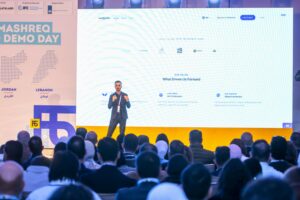Ranja Ali is a 2019 alum of The Experiment Digital who founded Wedonet, a digital platform that connects freelance specialists in the Middle East with local and global clients.
In an interview with Ali, he shares his thoughts on how The Experiment Digital impacted his career and the value of virtual exchanges for youth in general.
Below is a reprint of the interview, which first appeared in The Stevens Initiative’s 2024 Impact Report.

Ali at StartMashreq, a partnership between IFC Middle East and the Dutch Ministry of Foreign Affairs that showcases innovative startups from Jordan, Lebanon, and Iraq.
Can you describe your current role and how you are leveraging the skills you gained from your virtual exchange experience in your professional life?
It has been two years since I founded Wedonet, which is a platform that connects freelancers from more than 30 fields in Iraq to local and international clients. Participating in a virtual exchange helped me to expand my communication with international clients. Developing an international mindset and learning to work with people from different cultures was really beneficial for my communication, even still today.
As an entrepreneur and creative, how did virtual exchange prepare you for a role outside of a traditional nine-to-five office job?
While I was participating in The Experiment Digital, I was employed by some well-known companies in my home region of Kurdistan, Iraq. But being in a virtual exchange connected me much more to my local community. It helped me make international connections that enabled me to pursue Wedonet on a global scale. I have since traveled to more than eight different countries, including Australia, the U.S., Spain, Poland, and the Netherlands. When I strengthened my local and international community, it was easier for me to believe that I am a human of the earth, not a human of one country.

Ali at CES, an international tech event produced by the Consumer Technology Association.
In your opinion, what is the greatest benefit of this experience for young people like you?
The greatest benefits of participating in a virtual exchange are communication and networking. There is huge investment potential in connection. Networking is a better investment than gold, because gold has a set value, but the value of communication will always grow. The more connections you have, the more experiences you will gain. You never know what will happen next. Once you open your mind to a global culture, you will receive opportunities that you never thought about. You’ll feel totally different. You will no longer be the same person you were before.
Why should institutions—such as universities or youth-serving organizations—invest in implementing virtual exchange programs for their students?
Once you make virtual exchange an option for the young people you reach, you will see how these experiences change their mindsets. They will have bigger ideas, they will be more innovative, and they will become better entrepreneurs. They will have more confidence to work globally, not just in their local communities. If we make virtual exchange a must-have opportunity for young people, there will be a sea of positive change.
The Experiment Digital Leadership in STEM is implemented by World Learning and is supported by the J. Christopher Stevens Virtual Exchange Initiative (JCSVEI). JCSVEI is a U.S. Department of State’s Bureau of Educational and Cultural Affairs program administered by the Aspen Institute.
